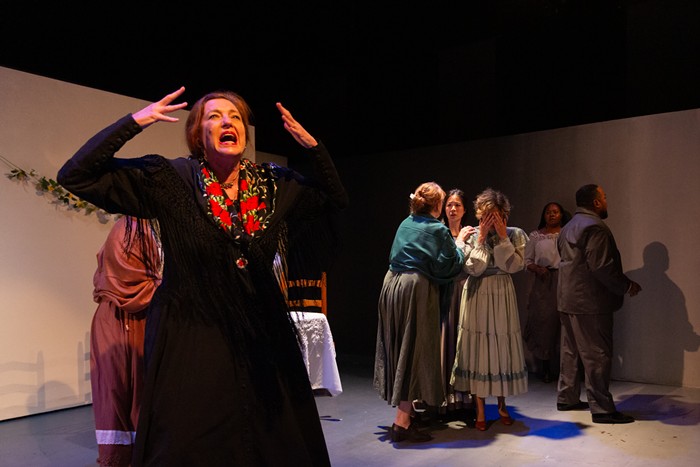The musical adaptation of the film Dirty Rotten Scoundrels, currently running at Broadway Rose, promises no improvements on the source material—instead, the staged version bolsters the irreverence of the original with a full lineup of rompy musical numbers. The result preserves much of the humor of the 1988 Steve Martin vehicle, but swaddles its genuine charm in a few musical numbers too many.
Globetrotting conman Lawrence Jameson (Leif Norby) boils down his MO in the show's opening number, "Give Them What They Want," explaining how he's made a successful career as a swindler by playing the role of a charming, wounded mystery man—and providing rich women an opportunity to make their own lives more interesting by helping him out. When he teams up with aspiring con artist Freddy Benson (Wade Willis), the two develop a relationship that's both cooperative and competitive—in the surprisingly coarse and completely hilarious number "All About Ruprecht," they work together to convince a love-struck heiress that Freddy is Lawrence's creepy, sexually unhinged brother. When their relationship tips into outright hostility, however, they make a bet on who can successfully swindle a wealthy soap heiress out of her $50,000 fortune.
On the whole, Broadway Rose does a fine job with the production—actors Leif Norby and Wade Willis are well paired; Norby is tall and cheesily suave, Willis appropriately shifty. As the heiress/love interest, Lindsay Michelet proves a vivid comedic actress, doing a guileless impersonation of a wide-eyed Disney heroine.
Eyan Candini's costumes deserve note: They're sexy and fun and absolutely appropriate to a show that wholeheartedly embraces its silly side. The script, too, is surprisingly bawdy, considering the demographic suburban musicals usually attract; I'd assumed boner jokes were the province of my generation, but the giggling bluehairs during a recent Sunday afternoon disproved that ageist assumption.
Now, diminished attention spans probably actually are the province of my generation, but at three hours, the show is just too long—an entire subplot about an unhappy American divorcee could easily have been excised, giving perfectly pitched scenes (like the high-kicking "Oklahoma") room to breathe. The show simply doesn't have enough meat to sustain its runtime; even the most well-calibrated spectacle begins to wear after the second hour or so.



















